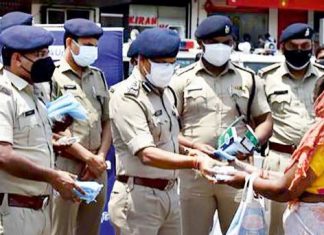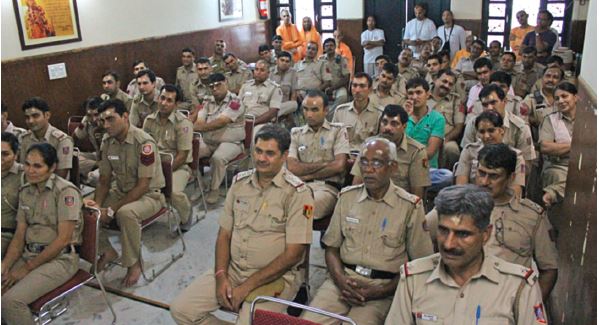 Everyone goes through tough times at some point in their lives. This causes stress, leaving us to struggle with the situation. The way in which it manifests and how one utilizes stress management techniques depends on the lifestyle one has. Though everyone deals with high stress, it is believed to be experienced most by those placed in with plenty of responsibilities, and those in authority. It is beyond doubt that the members of the police force deal with extreme level of stress on a daily basis.
Everyone goes through tough times at some point in their lives. This causes stress, leaving us to struggle with the situation. The way in which it manifests and how one utilizes stress management techniques depends on the lifestyle one has. Though everyone deals with high stress, it is believed to be experienced most by those placed in with plenty of responsibilities, and those in authority. It is beyond doubt that the members of the police force deal with extreme level of stress on a daily basis.
One of the biggest problems for police personnel is that stress can go unrecognized and unacknowledged. They are under constant stress and do not seek treatment. Many a time, they deny the stress they are experiencing for fear of being viewed as weak or not being able to handle their job.
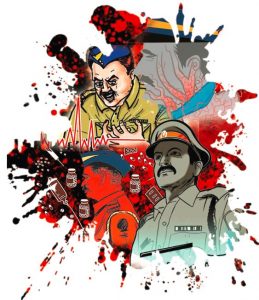 Causes of Stress
Causes of Stress
According to the National Institute of Justice, the following are work related and individual factors that contribute to stress and fatigue in law enforcement personnel.
Work-related Factors:
• Poor time management.
• Inadequate or broken equipments.
• Excessive overtime.
• Frequent rotating shifts.
• Regular change in duties, for eg., officers often spend a day doing paperwork, and intervening a violent dispute the very next day.
Individual Factors:
• Family and relationship problems.
• Financial problems.
• Health concerns.
 Even more specifically, they are likely to be stressed by the daily responsibilities that come with the job. According to an article, “Police Stress: Identifying & Managing Symptoms of Stress,” stress is caused by:
Even more specifically, they are likely to be stressed by the daily responsibilities that come with the job. According to an article, “Police Stress: Identifying & Managing Symptoms of Stress,” stress is caused by:
• Constant exposure to people suffering with distress and pain.
• Threats to an officer’s safety or health.
• Responsibility of protecting the lives of citizens.
• Compulsion of being incontrol of emotions even when provoked.
• Inconclusive nature of police work.
• Fast alternating pace of job(situations can escalate rather quickly in this line of work)
• Responsibility of owning a firearm.
Consequences of Stress
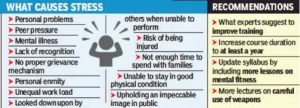 Like in any other profession,untreated stress can lead to serious consequences. These consequences not only affect the officer, but also those with whom he/she has daily contact, such as colleagues, supervisors, friends, family, and the public. Some of the consequences of job-related stress reported by police officers are:
Like in any other profession,untreated stress can lead to serious consequences. These consequences not only affect the officer, but also those with whom he/she has daily contact, such as colleagues, supervisors, friends, family, and the public. Some of the consequences of job-related stress reported by police officers are:
• Cynicism and suspiciousness.
• Emotional detachment from various aspects of daily life.
• Reduced efficiency.
• Absenteeism and early retirement.
• Marital or other family problems(extramarital affair, divorce, or domestic violence)
• Post-traumatic stress disorder.
• Heart attacks, ulcers, weight gain, and other health problems.
• Suicide.
How to Reduce Stress
A look at the American ‘1994 Omnibus Crime Act’ where the President and Congress recognized the severity of the problem(stress) and mandated a federal government response. As a result of this legislation, the National Institute of Justice was assigned the task of sponsoring research on police stress, establishing pilot programs to help officers and departments deal with police stress, and conducting program evaluations on current programs in an effort to support State and local efforts.
American Military University faculty members have written several articles about how police officers can reduce stress, specific to police work.
Law enforcement officers can reduce stress by:
- Planning meals, making healthy eating choices, and avoiding high-calorie fast food.
- Scheduling vacations and personal downtime.
- Consulting doctors regularly for check-ups.
- Sharing workload and reducing overtime period.
- Living within your financial means so that “moonlighting” with a second job is not necessary.
- Creating a realistic exercise program and forming healthy habits to get regular exercise.
- Creating a “Patrol Buddy” program and allocating time to check on each other.
- Mingling with civilian friends to divert from job-related stress. If you socialize with police friends, make it a point not to discuss work during your downtime together.
How to Manage Stress
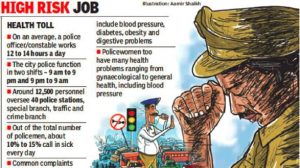 Not all stress is bad. In fact, it can be positive. It enables officers to walk out of difficult situations and motivate them to achieve. However, too much stress can affect your emotional and physical well-being and can cause significant problems in your life at home, work, and school. Fortunately, if you are experiencing negative stress in your life, there are means through which you can effectively manage it.
Not all stress is bad. In fact, it can be positive. It enables officers to walk out of difficult situations and motivate them to achieve. However, too much stress can affect your emotional and physical well-being and can cause significant problems in your life at home, work, and school. Fortunately, if you are experiencing negative stress in your life, there are means through which you can effectively manage it.
The following are some important ways to deal with stress through effective time management.
• Work out a plan to ensure there is a balance in your life.
• Set aside specific time for your responsibilities.
• Set goals for yourself and avoid procrastination.
• Make sure you get enough sleep and limit the use of caffeine.
• Be conscious of your limits and set realistic goals.
• Set aside time for exercise and leisure activities.
• Maintain a positive attitude by opting to see the brighter side of every situation.
Stress will not disappear from our lives. Yes, we should seek professional help should the need arise. Let us also remember that we are unique individuals, with an inner strength that will pull us through any situation we face. Some of them may look impossible to conquer, but the key is to be resilient, keep moving forward, and remain as positive as possible. Once stress is acknowledged, officers can work to effectively manage it and not let it consume their lives.
Tough times don’t last, but tough people do.




